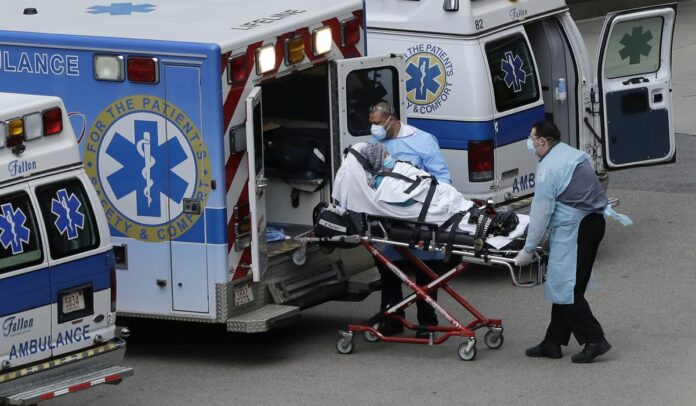State governments crafted plans behind closed doors for how health care facilities must allocate life-sustaining treatment in a doomsday COVID-19 scenario, raising alarm that bureaucrats will decide who lives and who dies.
Crisis standards of care in some states have scoring systems and a “lottery” to determine who would win medical treatment and who would lose out. These triage decisions, critics say, are best left to front-line physicians.
As the coronavirus crisis emerged, governors enacted various standards through executive orders.
Hospitals applied their own standards to address issues such as who gets ventilators and beds in intensive care units.
Exactly who created these standards and which hospitals deployed them is not fully known.
In Massachusetts, the crisis standards of care guidelines announced in April ignited a firestorm of criticism from across the political spectrum.
Rep. Ayanna Pressley, Massachusetts Democrat, sounded the alarm of potential discrimination, and the free market think tank Pioneer Institute raised concerns that vulnerable populations had no opportunity to vet the process that could determine whether they live or die.
Gov. Charlie Baker, a Republican, issued revised guidelines at the end of April. The guidelines included a color-coded scoring system that took into account “life cycle considerations,” or how much longer coronavirus-infected patients would be projected to live after undergoing treatment. In the event of a scoring “tie,” life-sustaining treatment would be allocated according to a “lottery.”
Barbara Anthony, a health policy scholar at the Pioneer Institute, said she thinks the revised guidelines are still insufficient because they remove the decision-making process about medical care from the clinician treating the patient.
“That’s really playing God, and I think it’s playing God with incomplete information,” Ms. Anthony said. “You can have a 75-year-old who may live, especially if you’re in my family, another 15 or 20 years, and to pit that against a 40-year-old who smokes, for example, who could drop dead of a heart attack in six or seven years, we don’t, there are so many variables involved that I just take complete issue with these forecasts based on criteria. The rules should and can be rewritten,” said Ms. Anthony, a former undersecretary at the Massachusetts Office of Consumer Affairs and Business Regulation.
The criteria states use to predict COVID-19 patients’ life spans are closely guarded. The Massachusetts governor’s office and the state Department of Public Health refused to answer questions about the standards from The Washington Times.
Disability rights advocates filed complaints in March about crisis standards adopted in Alabama and Washington state, including with the U.S. Department of Health and Human Services.
Roger Severino, director of the HHS office for civil rights, said his office would work to protect Americans from the “ruthless utilitarianism” resulting from life-and-death decisions during the coronavirus outbreak.
The Trump administration issued recommendations for crisis standards for state officials to consider.
The White House enlisted a 12-member Crisis Standards of Care group led by Dr. John Hick of Hennepin County Medical Center in Minnesota and Dr. Dan Hanfling of In-Q-Tel, the CIA-contracted venture capital fund, under the auspices of the National Academies of Sciences, Engineering and Medicine.
The working group’s recommendations provide “principles and guidance” but stop short of ordering measures such as lotteries for life-sustaining care.
“It is neither appropriate nor feasible for us to detail actual choices and preferences that apply to specific situations, each of which depends on the exigencies of the epidemic relative to locally available facilities, equipment, personnel, and other needed resources,” the working group wrote. “Rather, this document describes the basis upon which to carry out such decision making whenever it has to happen.”
Virginia considered the working group’s recommendations when developing its plans, said Dr. Parham Jaberi, Virginia Department of Public Health chief deputy commissioner for public health and preparedness.
“The document was informative, but I do not recall pulling any specifics from that report into our guide,” he said.
Virginia has not fully disclosed how life-and-death decisions would be made under its crisis standards. Officials keep under wraps how limited medical resources would be allocated and whether a lottery or other process would settle a tie when two patients qualify for limited treatment.
The state’s COVID-19 unified command structure includes a task force responsible for planning alternative sites if health care facilities are overrun and for developing strategies to manage and mitigate a surge in patients.
Virginia has not met the threshold for enacting crisis standards of care, such as staffing shortages at health care facilities, lack of life-sustaining resources or complete depletion of medical countermeasures, officials say.
HHS has emphasized that the federal government is not forcing states to adopt its crisis standards of care recommendations, nor is it bothering to track whether anyone is.
“There are no federal crisis standards of care authority,” said HHS spokeswoman Gretchen B. Michael.
“Decisions about scarce resources can be extremely challenging,” Ms. Michael said. “State and local authorities, as well as health care facilities, have greater insight into the needs of their communities and are best positioned to make these difficult decisions.”
Although states apply different standards, they are generally operating under conventional, contingency or crisis standards of care.
Virginia adopted contingency standards of care on March 20. The crisis standards pertain to a sustained catastrophe rather than a busy night in the emergency room.
If doctors begin entering patients into state-developed lotteries for their lives, it is not clear whether the public would have any warning. HHS said it does not track whether crisis standards of care are implemented, and states do not have a uniform approach.
Massachusetts’ latest guidelines require hospitals to notify the Department of Public Health upon enacting crisis standards, but whether the list of hospitals using crisis standards will ever become public is unknown.
Many states and hospitals have avoided operating under crisis standards during the pandemic, but they may have more difficulty delaying implementation as states reopen.






